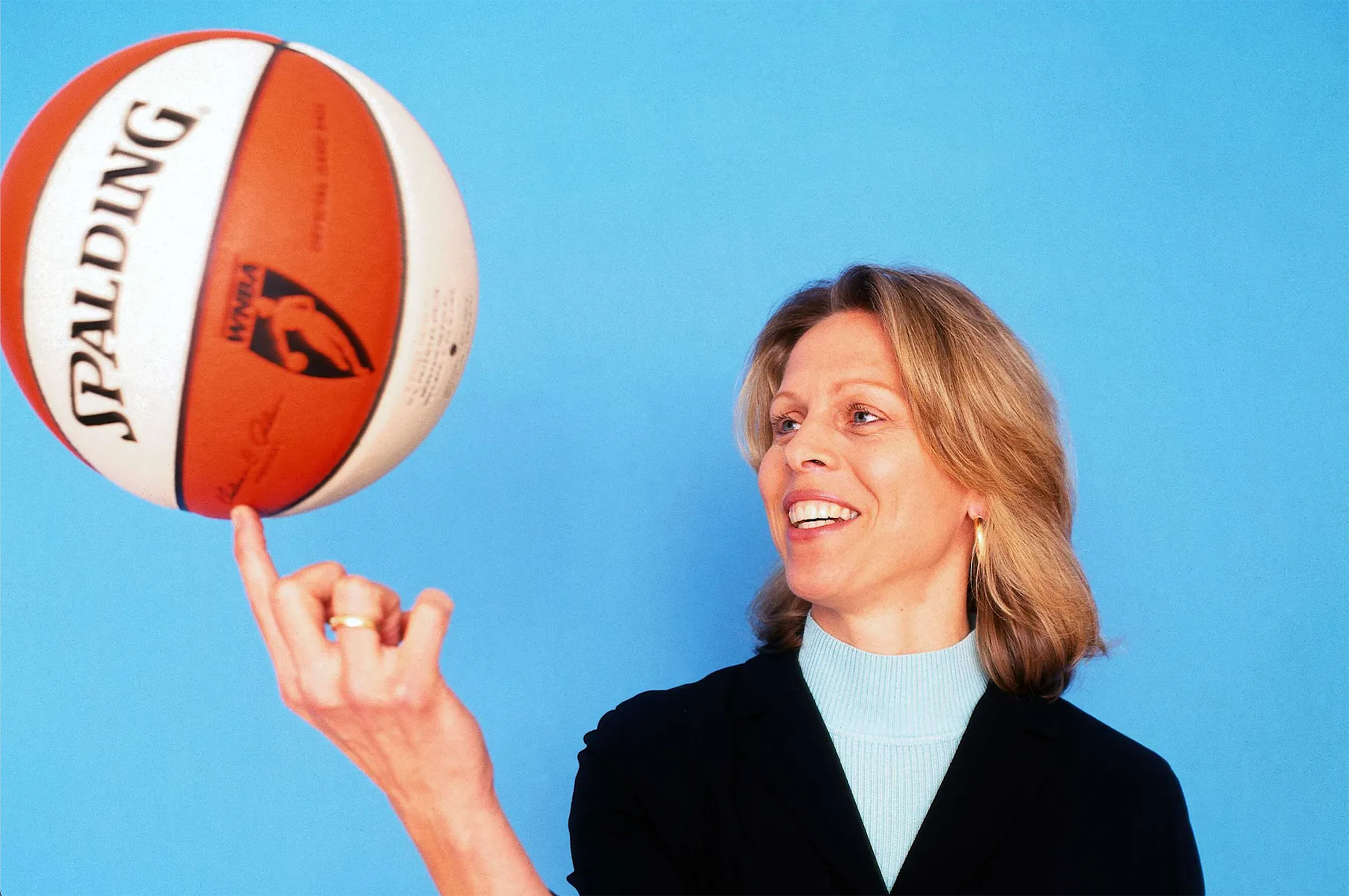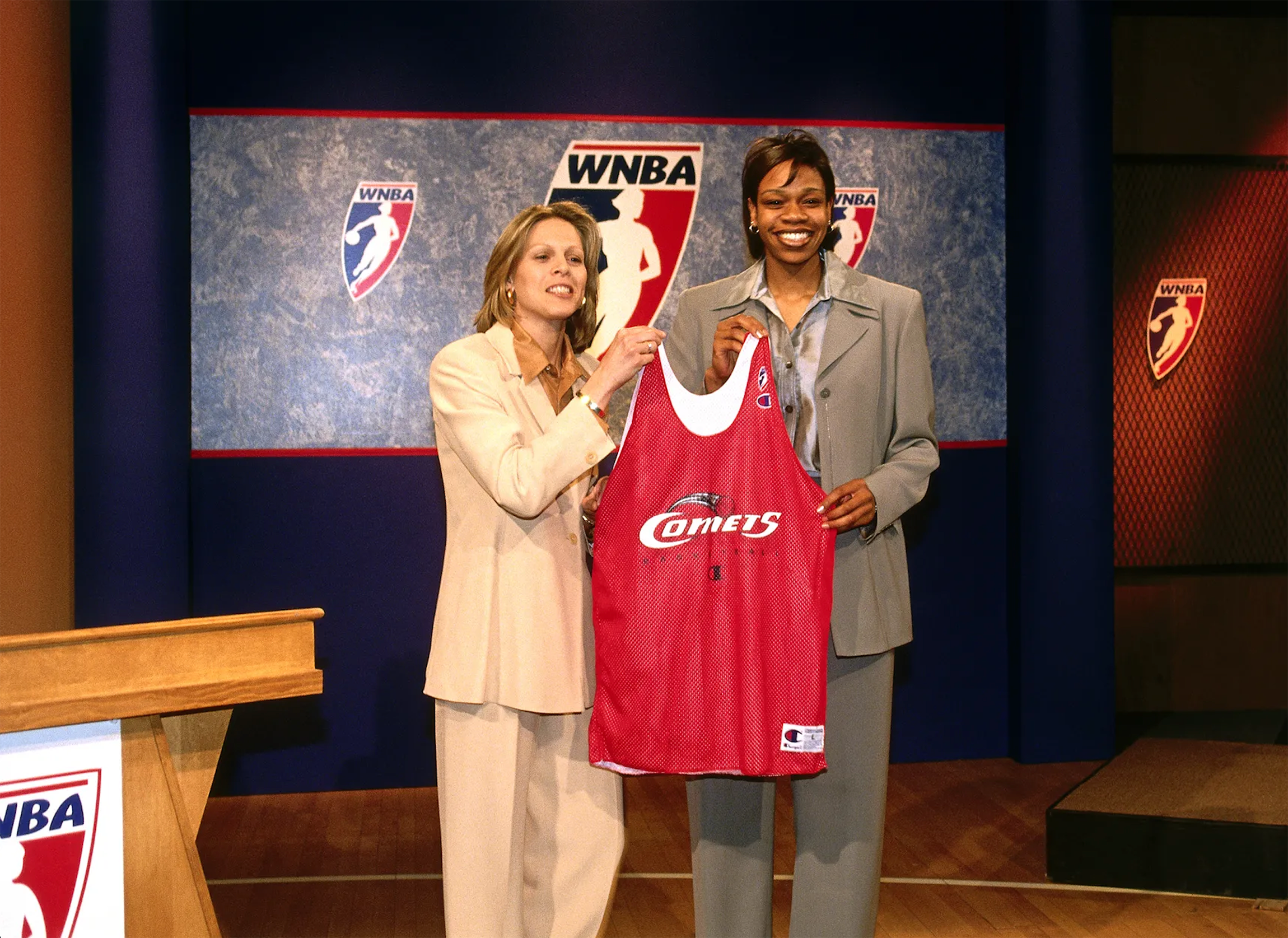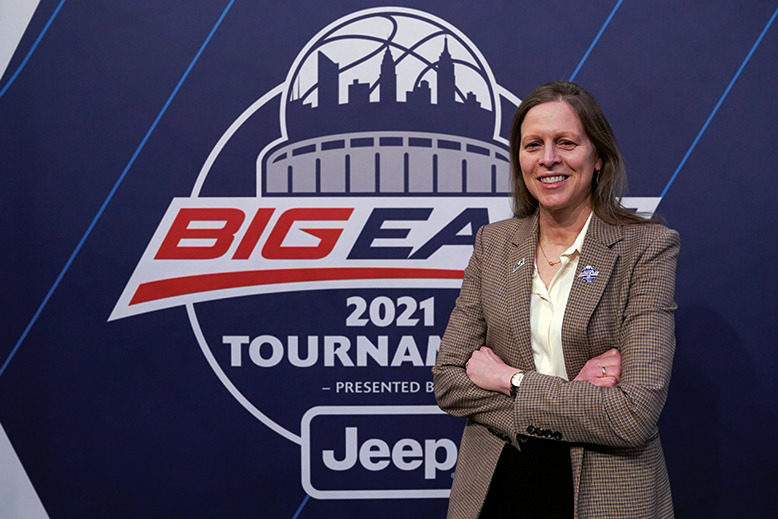Val Ackerman
League and Team
Year Inducted: 2023
“Try to leave this world a little better than you found it.”
It’s a sentiment that rings more like advice given to you by your grandfather when you’re too immature to appreciate it, but spend enough time on this planet, and it becomes apparent that it might just be the best mantra to live by.
Few people in the history of sports business and media have built a more successful and impactful career on making the sports world better than she experienced it than Val Ackerman.
Founding president of the Women’s National Basketball Association (WNBA). President of USA Basketball. An executive behind the iconic “Dream Team.” Commissioner of the Big East Conference. Val Ackerman’s life has taken her across the executive offices of her beloved game of basketball and forever reshaped the world of sports — for athletes, for fans, for television, for women, for all of us.
“Val has helped shape men’s and women’s basketball at every level of the game,” says NBA Commissioner Adam Silver. “Her steady leadership combined with her unflappable persistence has elevated so many aspects of the sports media and has left a profound impact on the coverage and scope of the sports industry.”
Born and raised in New Jersey, Ackerman was a multi-sport athlete in high school and went on to be a four-year starter and three-time captain for the University of Virginia Women’s Basketball Team. In the immediate afterglow of Title IX, she was one of the school’s first female scholarship athletes. When she graduated, there wasn’t much available to her in the way of a professional basketball career in the U.S., so she played overseas in France for a year before returning stateside to pursue her law degree at UCLA.
After a short stint at a law firm, Ackerman knew her athletic world and her academic career were meant to unite. She was hired as a staff attorney at the National Basketball Association (NBA) in 1988.
She credits the early growth in her career to working with an impressive set of mentors, including current NHL commissioner and Sports Broadcasting Hall of Famer Gary Bettman (who first hired Ackerman), former NBA deputy commissioner and Naismith Basketball Hall of Famer Russ Granik, and, of course, iconic former NBA commissioner and Sports Broadcasting Hall of Famer David Stern.
In 1990, Ackerman became special assistant to the commissioner, working directly with Stern. “That gave me proximity to the life of a commissioner, what crossed David’s desk, all the things he had to manage,” she recalls.
Her tenacious work ethic and intelligence had her moving up quickly through the ranks at the NBA. Her career took its first unique turn in 1989, when the International Basketball Federation (FIBA) voted to allow professional players to participate in the Olympic Games. The U.S. was reeling from a devastating loss to the USSR in 1988, and work on assembling the iconic “Dream Team” had begun. Ackerman was one of the NBA’s original appointees to the USA Basketball Board of Directors in 1989 and served as an organizational liaison with USA Basketball during the early years of NBA participation in national-team competitions, including the 1992 and 1996 Olympics and the 1994 World Championships.
Val Ackerman was the first president of the Women’s National Basketball Association (WNBA) when the league launched in 1997. She oversaw operations for its first eight seasons.
Success on the international stage spread to the women’s game as Ackerman played an integral role in the success of the U.S. women’s national program, which has won gold medals at each of the last seven Olympics, dating the 1996 Atlanta Games.
Growth of the USA women’s basketball program and mainstream success on the Olympic stage laid the groundwork for what is perhaps Ackerman’s greatest career accomplishment: spearheading the launch and serving as the first president of a new women’s professional basketball league, the WNBA.
“When we ‘decided’ that we would start the WNBA — and I put the word in quotes because I think Val made it clear that we didn’t have a choice — she was the natural person to lead it, which she did for many years,” said late former NBA commissioner David Stern in 2013 upon Ackerman’s appointment as Big East commissioner. “Not only lead it but launch it and lead it. The fact that the league exists is a result of Val’s efforts and drive behind it.”
Ackerman guided the league through its formation and to its widely successful debut in 1997, heading day-to-day operations for its first eight seasons. She says she’ll never forget sitting courtside at the New York Liberty’s first home game at Madison Square Garden and watching Stern sit speechless.
“It was exhausting. It was exhilarating,” she recalls. “Those of us who worked on it — and there were many of us at the league office — felt like it was a cause, not just any old project. It felt like a cause because it was about bringing women more deeply into the game of basketball. It was very exciting, especially in the early years, because our fan support was so strong and there was so much buzz around the league. To be part of that launch was a once-in-a-professional-lifetime experience.”
Today, the WNBA is enjoying unprecedented success. The 2023 season television-viewership numbers were the highest they have been in more than two decades, and the league continues to grow in star power and in the number of franchises popping up across the country. It’s growth that the league’s first boss looks back proudly on.
Val Ackerman (left) with the No. 1 pick in the first WNBA Draft in 1997, Tina Thompson of the Houston Comets.
“I’m very glad to see it,” Ackerman says. “We all believed so deeply in this idea. It seems like it has taken a while for the world to catch up on the vision, but better late than never would be my answer to that.
“I do think,” she continues, “we thought it would be a marathon and not a sprint to establish the league. We thought it might take a generation for the young girls of that time to become the adult consumers of the future, who would buy the tickets and watch on television and support the league in important ways commercially, which is critical for any league. You need that commercial support; you’ve got to generate revenue. That’s happening now: the players are selling themselves, the rivalries are developing, we’re seeing bona fide stars. There are some tried-and-true ways to build a sports league, and it seems like those are kicking in now in a serious way for the WNBA, and that’s great news.”
Says current WNBA Commissioner Cathy Engelbert, “Val’s efforts were vital in not only establishing the WNBA but also providing opportunities for women athletes to compete at the professional level in the U.S., setting the stage for the exponential growth the game enjoys today.”
Ackerman’s professional-basketball career is of a caliber most can only dream. She was inducted into the Naismith Memorial Basketball of Fame in 2021, the Women’s Basketball Hall of Fame in 2011. Thanks to her accomplishments, future female basketball players will have opportunities that weren’t afforded to her when she was young. Although that fact is not lost on her, she says that she never let that make any of her executive feats bittersweet.
“I’ve never let that get to me,” she says. “When I played basketball in college, we had very little. I mean, I was playing in the early years of Title IX, and things were not equitable. We saw the men’s team getting this amenity and that amenity, and we were at the ground floor. Now that’s very different. Yeah, at times, I guess there are some pangs that, wow, that would’ve been fun or that would’ve been nice to have. But that sentiment is generally overwhelmed by the sense of satisfaction that I was part of the foundation. It is better now than it was when I started.”
The selfless drive to make the sport she loved a better place for today’s athletes has, perhaps, been the key ingredient in a revered career.
“The greatest victories in sports are not measured by strength alone,” notes Carol Stiff, former ESPN executive and Women’s Basketball Hall of Famer. “They are achieved by those who broke down barriers, paved new paths, and empowered those around them to pursue excellence. Val continues to be just that: a pioneer, a champion in sports, especially women’s sports. She has inspired us all to push beyond the limits and rewrite history.”
Adds Ackerman, “It’s not that it didn’t happen for me. It’s that it did happen after all for others and that I was able to be a part of making that opportunity available for women’s basketball players and being a part of what that has meant for women’s sports at large.”
And then there’s her current job as commissioner of the Big East Conference. A league that, at the time of her arrival a decade ago, seemed destined to be the first sacrifice at the altar of conference realignment. Today, the league is again prospering as one of the premier conferences in collegiate athletics; still headlined by her great love: basketball.
“It was the right opportunity for me at the right time,” says Ackerman. “In many ways, it’s full circle because of my experience as an athlete in college. I’m proud to be here given my basketball roots. Most of all, I’m just proud to be in a league that has such incredible basketball history, that cares so deeply about the game, where every single school is 100% committed to being relevant and competitive in the sport. I really have felt at home here.”
During her time at the helm, she has ushered in a partnership with the league’s primary media-rights partner, Fox Sports; brokered a deal to keep the men’s basketball championship at Madison Square Garden; moved the conference’s offices to New York City; and even oversaw negotiations to bring back one of the conference’s charter members, the University of Connecticut, in 2020. The league also launched BIG EAST Digital Network, which carries hundreds of live sports broadcasts each year, granting access to more sports to fans all around the world.
“I do enjoy the fact that it’s 22 sports, 12 of them women’s sports,” adds Ackerman. “I’ve learned a lot here. It has been kind of a professional-development opportunity for me because the space is very different. It has been a great ride, and three national championships in the last seven years certainly has been icing on the cake for us. There’s nothing quite like winning a national championship in basketball, and we’ve had the privilege of being in the front row when that has happened. It has been very exciting.”
Although it may be a bit of an oversimplification to celebrate Ackerman’s many career accomplishments through the singular lens of sports broadcasting, there’s little doubt that her ambition and vision were a perfect fit for an exploding live-sports-television ecosystem. She built properties that hadn’t existed before (particularly for her as a young woman), and television delivered those properties into the homes of young fans across the country and to young women, who now have a professional path to follow.
Granting opportunities. Changing lives. Not just women’s sports but all of sport is better for it.
“Television has touched every part of my professional career,” notes Ackerman. “I’ve had a front-row seat to see the power of television as it relates to the sports business. I have met, over the years, many impressive executives who work at the networks, all of whom have been terrific partners. To receive an honor from colleagues in the TV business is quite humbling. TV has made so much of my journey possible. It’s a real honor.”



